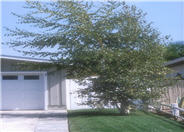
Common name:Chinese Wisteria
Botanical name:Wisteria sinensis
While the sinensis is similar to the floribunda, it bears more rounded, full clusters of strongly fragrant flowers which open more or less all at once. There are usually 13-15 leaflets per leaf, and they require full sun and average to little watering. It comes in many colors such as blues, whites and purples.-Monterey Bay Nursery

Common name:Blue Oat Grass
Botanical name:Helictotrichon sempervirens
The blue oat grass is an evergreen blue clumping grass that grows 12"-18" tall and wide. Its showy flowers are 1'-2' above the foliage. This plant looks good alone as well as in mass plantings. The blue oat grass likes dry hill sides and is drought tolerant. -Cornflower Farms

Common name:Cushion Dusty Miller, Silver Ground
Botanical name:Senecio cineraria
The Dusty Miller grows to 2' tall and wide, with velvety gray leaves that have broad, roundish lobes. Yellow flowers heads appear in summer and sometimes, intermittently. Dead head occasionally to encourage bushiness. Use foliage for cut flower arrangements. It prefers full sun and medium amount of watering. It is not frost hardy.

Common name:Chinese Pistache
Botanical name:Pistacia chinensis
The Pistacia chinensis is a deciduous tree with broad, spreading growth to 50' in height. Its leaves have 10-16 leaflets, and the fall coloring arrives in beautiful shades of red, orange and yellow. Prune young trees to shape. This tree does not have edible nuts. Female trees have tiny red fruit, turning dark blue. It prefers full sun and deep, infrequent waterings. This is a great street or park tree.

Common name:European White Birch
Botanical name:Betula pendula
This medium-size weeping tree will grow to about 40' tall and has a whitish-brown bark with deciduous green leaves.

Common name:Sticky Monkey Flower
Botanical name:Mimulus aurantiacus
Sticky Monkey Flower is a drought tolerant evergreen shrub 4' tall with numerous orangish-yellow flowers in spring and summer. It is a California native that attracts hummingbirds. This shrub can be found on the dry hills and canyon slopes in the Sierra Nevada foothills and the central Coast Ranges.
-Cornflower Farms
In the natural world the endless cycle of birth, growth, decay, death and rebirth flows throughout the seasons. Plants die, leaves fall and new growth springs up in its place. Nothing is lost and the fallen leaves and dead plants decay into the soil, enriching it for the next generation of growth.
Click in the green box for more information
Designer:
Photographer: GardenSoft
Physical weed control, including mulching, or hand removal protects the watershed from harmful chemicals.
Group plants in your garden according to their water needs (hydrozone).
Drip and other smart irrigation delivers water directly to roots, allowing no excess water for weeds.